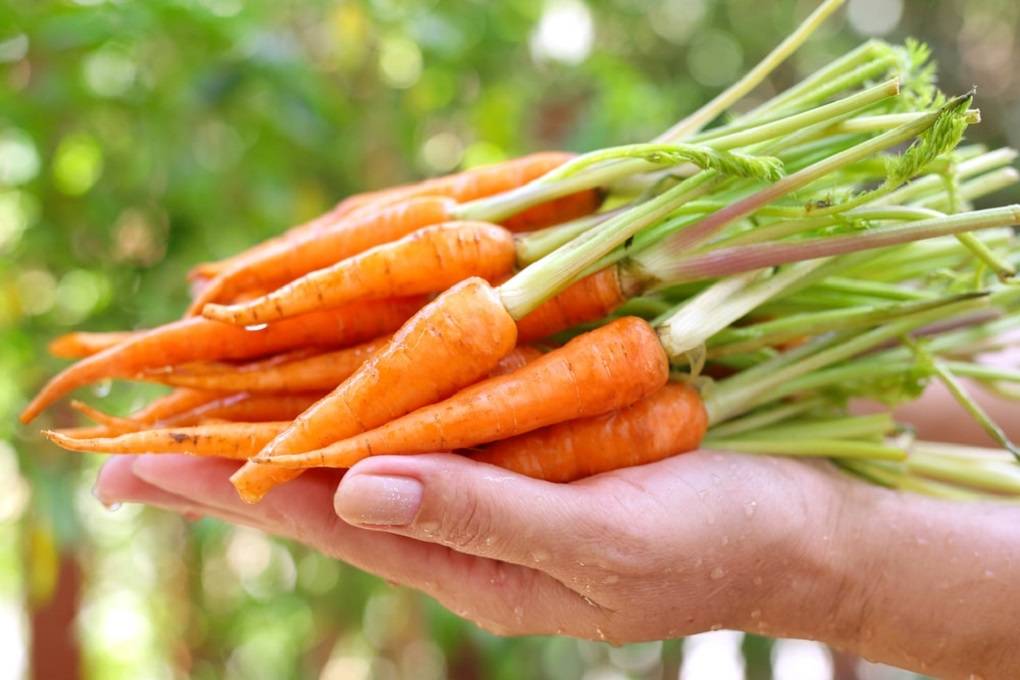
Baby carrots are carrots harvested before reaching maturity. Oftentimes, larger carrots are cut into smaller pieces and sold as ‘baby carrots.’ However, certain cultivars of carrots have been bred to be used especially at the ‘baby’ stage. These types of carrots are usually sweeter and more tender than fully-grown carrots.
Baby carrots are full of essential nutrients such as vitamin A, biotin, vitamin K1, potassium, and vitamin B6. They have a high-water content and are also a rich source of carbs and fibre. Baby carrots have very little fat, and protein, and also have a low-calorie intake. They also have several health benefits. For instance, they prevent age-related macular degeneration, support healthy digestion, keep our teeth and gums healthy, and promote healthy glowing skin.
Now, let’s take a look at how to grow baby carrots.
Baby carrots can be grown in the ground and in pots. Depending upon the variety you choose, baby carrots can take 60 to 70 days.
Seeds
Baby carrots are root vegetables that can be propagated via seeds or carrot tops. When propagating baby carrots from their tops, you must cut the tops of the carrots along with the green leaves and then sow them deep inside the pot. On the other hand, seeds can be planted directly into the ground about 4 cm deep.
Sunlight
Carrots grown in pots and large containers require at least 5 to 6 hours in direct sunlight. However, some varieties prefer different conditions. Therefore, you must refer to the seed packet before finding a spot for your carrot container.
Temperature
Usually, carrots are considered winter vegetables. If you wish to enjoy carrots in the summer, then you must sow the seeds in early spring, so that the carrots are available for use in the summer. Carrots can produce too much hair and lose their flavour when grown during peak summer.
You can also sow the seeds at least 2 months in advance of extremely cold weather conditions. That way you can harvest the carrots right before the frost hits. The ideal temperature to grow baby carrots is between 15 to 22 degrees Celsius. They don’t do well in temperatures over 30 degrees Celsius. The seeds even take longer to germinate.
Soil
Baby carrots tend to thrive in fine loamy soil that is rich in nutrients. You can prepare the soil by adding organic compost to the soil to improve its quality. The pH of the soil should be between 6.3 to 7.5. If the pH of the soil is lower than 6.3, then you can add dolomite lime. Baby carrots also thrive in soils that have high levels of potassium and phosphorous.
Irrigation and Humidity
Baby carrot seeds require a lot of water when they are in the germinating phase. It is important that you neither overwater nor underwater the plant as it is not conducive to its germination. Water your plant based on the moisture content of the soil. Stick your finger into the soil, if it doesn’t feel wet on the touch, then it is time to water. It is important to maintain constant moisture levels for baby carrots otherwise the carrots will split and lose flavour.
Fertilizers
The soil needs to be fed regularly while growing baby carrots, especially when the carrots are at least 4 to 5 inches. You must choose a fertilizer that has more phosphorous and potassium than nitrogen, phosphorous and potassium encourage root development. Excess nitrogen must be avoided because it encourages foliage production.
Harvest
Baby carrots are ready to be harvested 60 to 70 days after sowing. It is important to harvest them during this period otherwise they will attract many animals. Dig around the top of the carrot to loosen the soil and pull the carrots from the bottom.











